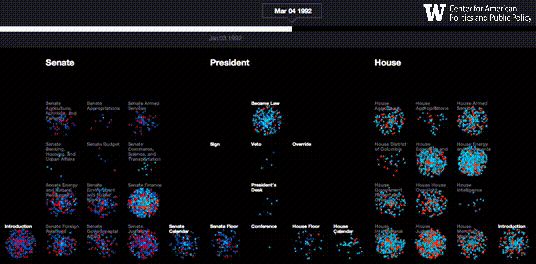The previous comparison of the 102nd and 112th also reveals differing patterns of lawmaking activity. One of the lessons that emerges from exploring these differences is that members sponsor bills for many different reasons. The visible bursts and lulls in activity are often explained by predictable events (such as the beginning and end of sessions or congressional recesses). However, others are more intriguing.
Over the course of a couple of days in 102nd Congress (late March of the second session), dozens of Republican-sponsored (red) bills were referred to the Senate and House Appropriation committees (the middle committee in the top row of each chamber). Clicking on some of these bills revealed that all were introduced by just two lawmakers, Senator John McCain and Rep. Fawell Harris. What’s going on here? In this case, action by the President helps to explain action by lawmakers. All of the bills sought to force the Democratic Congress to vote separately in favor of “pork barrel” projects if it wanted to restore funding that President Bush had recently rescinded (Feldman an Perotti 2002).
 There were even larger bursts of activity during the second session of the 112th Congress (April) as hundreds of bills were referred to the Senate Finance and House Ways and Means committees over about a week. Clicking on some of these bills revealed that they were all tariff-related. The explanation in this case is that members were introducing bills in response to an internal process. The Finance and Ways and Means chairs announced they would be drafting an omnibus “Miscellaneous Tariff Bill (MTB)” later in the year. They invited members to propose specific tariff provisions in the form of bills. The bursts reflects the fact that most members introduced their bills just prior to the announced deadline.
There were even larger bursts of activity during the second session of the 112th Congress (April) as hundreds of bills were referred to the Senate Finance and House Ways and Means committees over about a week. Clicking on some of these bills revealed that they were all tariff-related. The explanation in this case is that members were introducing bills in response to an internal process. The Finance and Ways and Means chairs announced they would be drafting an omnibus “Miscellaneous Tariff Bill (MTB)” later in the year. They invited members to propose specific tariff provisions in the form of bills. The bursts reflects the fact that most members introduced their bills just prior to the announced deadline.

